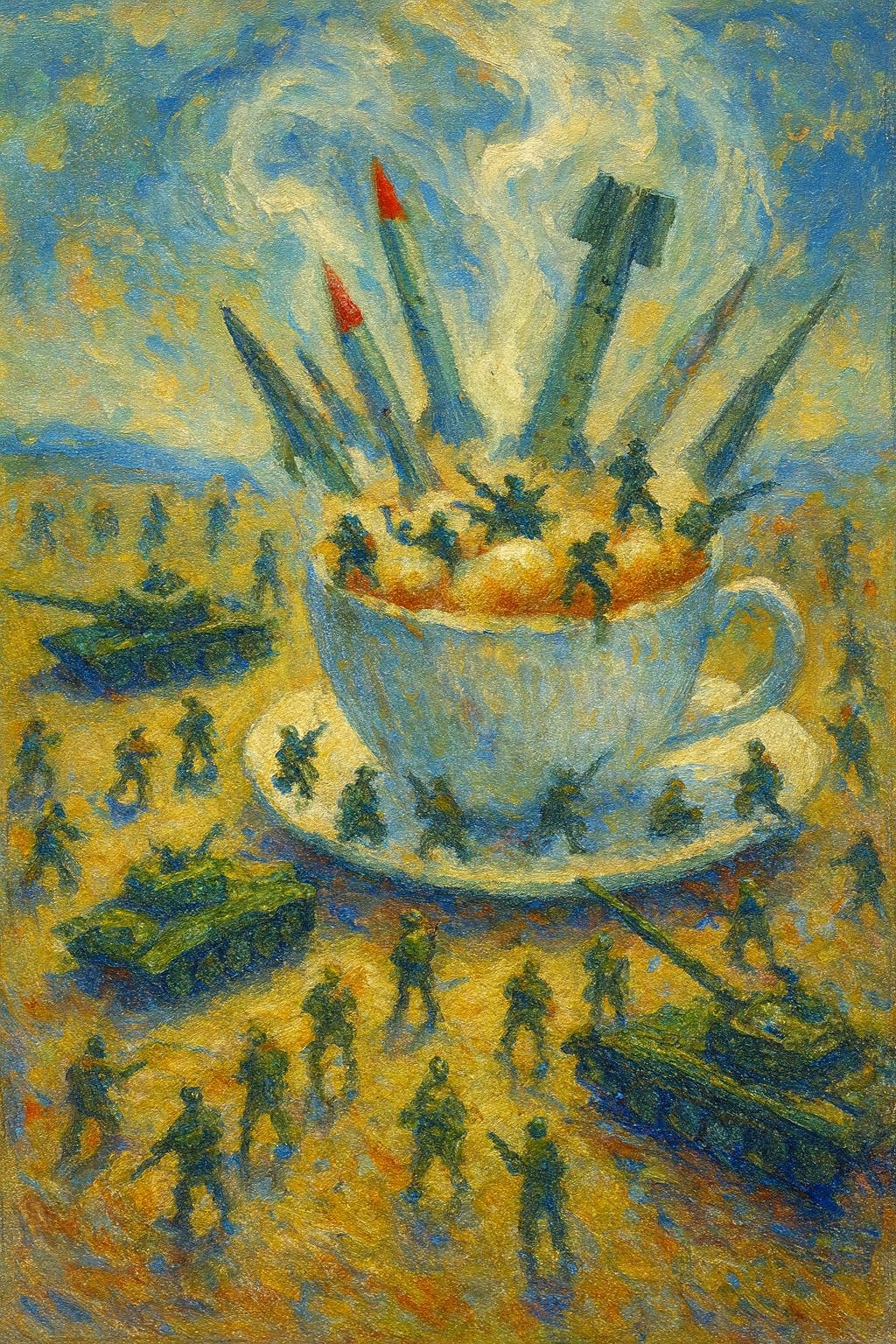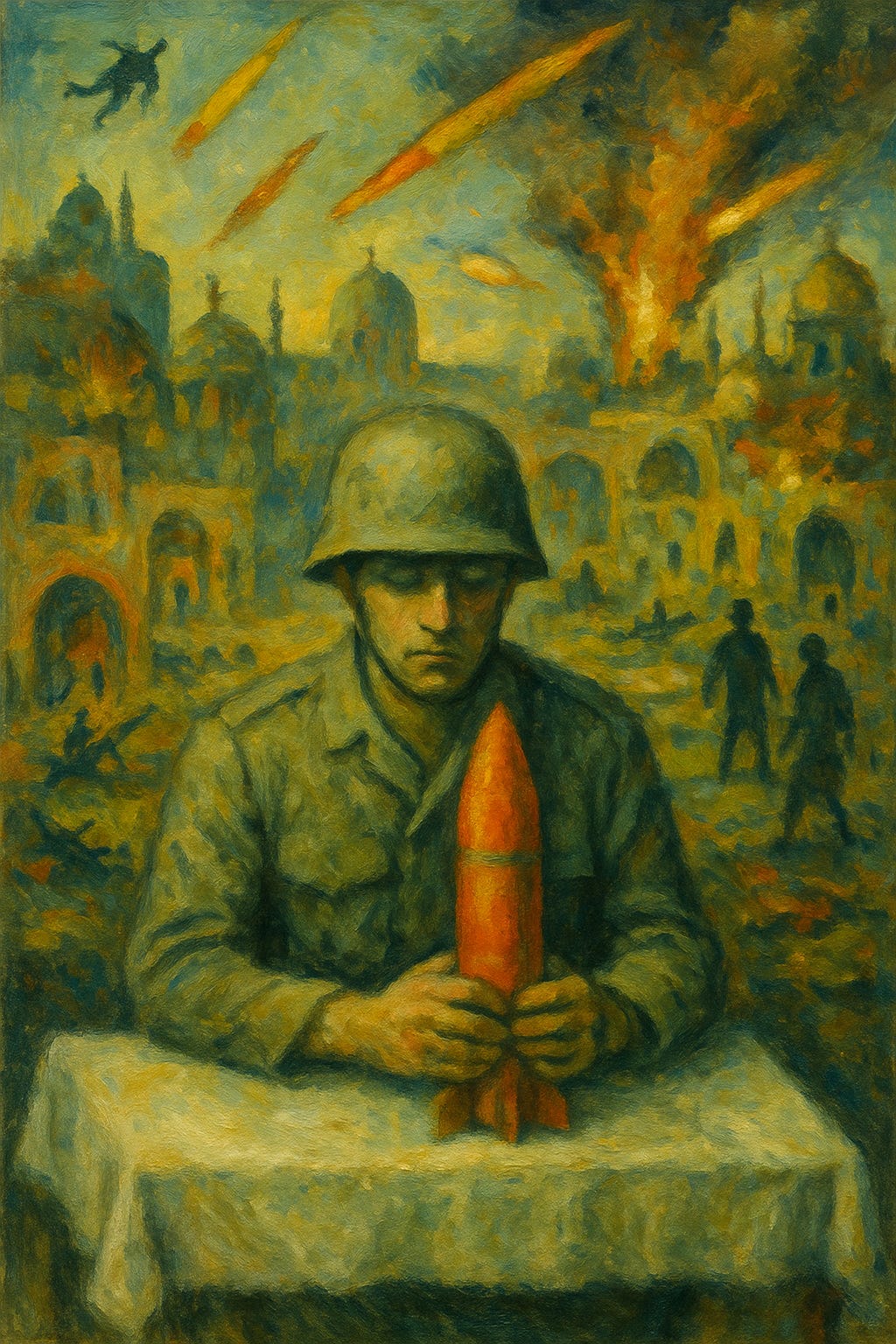Magic Realism and the Blood Libel Against Israel
When the world demands miracles of Jews in war, it isn’t morality—it’s prejudice dressed as pity.
If you believe in free speech—not the bumper sticker, but the unruly, rabid mongrel that snarls at polite society—then you can help keep it alive here. Every paid subscription buys me time to write without kowtowing to the kind of people who think “problematic” is an argument. And lawyers and bureaucrats have already tried to shut it down.
I said no, and they went away.
It’s five dollars a month. Canadian dollars. Which means it’s even less than you think—practically pocket lint if you’re south of the border. For that, you’ll get at least three heretical essays a week, plus open comments (the sort of thing legacy outlets treat like anthrax).
People always say, “Oh, it’s just a cup of coffee.” True. But when you get to the Substack counter, please pick my coffee. I guarantee it’s cheaper than Starbucks, and it comes spiked with the bitterness of reality—foam-free, censorship-free, and worth every loonie. Cheers.
Magic realism, that literary sleight-of-hand where the grotesque parades as the everyday—think García Márquez’s yellow flowers raining from the sky or grandmothers floating across a living room—has migrated from literature to geopolitics.
It now dictates the fever-dream expectations imposed on Israel. In this surreal theatre, a nation that watched 1,200 of its citizens butchered in a single day is commanded not to defend itself like any other state, but to perform an impossible trick: to fight an invisible war with one hand tied, to feed and water its sworn enemies, to heal those who would gladly see it annihilated. This is not the sober arithmetic of history. It is a hallucination dressed as policy, a cruel parody that demands Israel perform miracles while standing trial for existing.
On October 7, 2023, the curtain was torn away. Hamas gunmen, aided by between 600 and 1,000 ordinary Gazans, streamed across the border. These were not all hardened militants. Many were neighbours, shopkeepers, day-labourers—“regular” Palestinians who seized the moment to loot, burn, and murder. They dragged hostages from homes and safe rooms, raped women in kibbutzim, and carried off children as trophies. The fiction of a sharp line between Hamas and “the people” dissolved in the blood and ash of that day. There is a division, yes, but not the comforting, antiseptic one that international commentators pretend exists.
Yet rather than provoking unambiguous recognition of Israel’s right—indeed, its obligation—to strike back, the massacre elicited lectures that it must fight uniquely “clean” wars, wars no other nation has ever been required to wage. Gaza is not Fallujah, Grozny, or Mosul; it is worse. Beneath its streets runs the “Gaza Metro,” 350–500 kilometres of fortified tunnels, some plunging 70 meters down, with command posts, weapons depots, living quarters, even holding cells for the kidnapped. A rescued hostage called it “a spider’s web—the Viet Cong times ten.” These are not primitive burrows. They are a subterranean state, electrified and ventilated, built deliberately under hospitals, schools, and mosques so that every strike against a command centre becomes a photo opportunity for international outrage.
Take Al-Shifa hospital, Gaza’s largest medical complex. Israel uncovered a fortified tunnel beneath it, far longer and more elaborate than first claimed, confirmed by U.S. intelligence to have served as a Hamas command hub and hostage facility. And yet when Israel targeted the site, headlines screamed of “disproportionate response.” As though Hamas’s cynical choice to turn a maternity ward into an ammunition dump could be ignored, the blame was shifted entirely onto Israel for daring to strike back at all.
The grotesquerie only deepens. Hamas leaders boast: “We love death the way you love life.” This is not rhetoric—it is doctrine. It explains rockets hidden under kindergartens, launchers beside playgrounds, hostages held in tunnels beneath classrooms. As of September 2025, of the 250 people kidnapped on October 7, only around 48 remain unaccounted for, and perhaps just 20 are still alive. Their fates flicker in propaganda videos, then vanish from the world’s headlines as if the ground itself swallowed them. Imagine for a moment if 20 Canadians or Frenchmen languished in dark cells for nearly two years—would their plight be met with such silence?
Above ground, the skies over Israel still rain iron. Since the war began, Hamas and Hezbollah have launched tens of thousands of rockets. In March 2025, Hezbollah’s barrage forced 60,000 Israelis into internal exile, families abandoning their homes in the north to live as refugees inside their own country. In June, Iranian ballistic missiles struck Soroka Hospital in Be’er Sheva, Israel’s largest hospital in the south, shattering wards and wounding dozens. Human Rights Watch even called the attack a likely war crime. And yet the world’s response was a shrug, as if hospital wards are fair targets when Israelis lie in them.
Meanwhile, the daily trauma of rocket sirens in Sderot or Ashkelon is dismissed with a weary roll of the eyes, as though it were no different than Canadians grumbling about a January blizzard in Winnipeg. “Part of living in the neighbourhood,” they mutter, as though dodging shrapnel and racing to shelters were a quaint local quirk, not a 21st-century outrage.
And through it all, Israel is scolded that it must feed, water, and provide medical supplies to the very population whose sons and neighbours butchered its people. No American force in Fallujah stopped mid-battle to hand out rations to insurgents. No Russian division in Grozny was told to repair hospitals for Chechen fighters. No coalition in Mosul was required to issue text alerts and drop leaflets before airstrikes. Only Israel is expected to serve simultaneously as combatant and caregiver, punisher and nurse.
All this while Hamas’s leadership grows fat on the proceeds of misery. Ismail Haniyeh is worth $4 billion. Khaled Mashaal, a billionaire. The late Yahya Sinwar, another $3 billion. Musa Abu Marzouk, $2–3 billion. These men gorge on aid, siphon off humanitarian shipments, and resell them at extortionate prices to the very people they claim to defend.
As Douglas Murray has written with acid precision, “There is no cause that cannot be monetised if the grievance is eternal.” In Gaza, grievance is not only eternal; it is a business plan.
So, precisely what is Israel being told to do? To dismantle a fortress city beneath the earth without disturbing the homes above it. To rescue hostages from shafts dug under nurseries. To absorb rocket fire without flinching. To provision its enemies even as it buries its dead. To win a war without mistakes, without collateral damage, without ever being permitted the grim allowances of history. No other nation has been asked to do such a thing. No other nation ever would.
This is not magic. This is not realism. It is a grotesque, unfair perversion of thought that strips Jews of context and of parity with other peoples. It is not the burden of higher expectations; it is the burden of prejudice. It is the presumption that Jews must bleed differently, fight differently, and suffer differently. It is the presumption that they may never act as other nations act in war, because their right to self-defence is always conditional, always doubted, always second-guessed.
Call it what it is. The double standard applied to Israel is not morality, nor is it magic realism. It is not yet outsiders without military knowledge claiming their own medal in speculative military idiocy.
It is prejudice—ancient, resilient, and dressed up in the language of concern. And whether its adherents admit it or not, when their rhetoric demands impossibilities of Israel that they have never demanded of any other nation, they are not practising justice. They are practising anti-Semitism.
Sources: Times of Israel (on tunnels under hospitals and the Gaza Metro), Reuters (subterranean tunnel network), National Review (ceasefire absurdity; world press bias), Commentary (double standard comparison), MEMRI (Hamas “love death” rhetoric and monetisation), Human Rights Watch, Washington Post (intelligence on hospital command use).
If you found value in this article and wish to support my ongoing work, please consider leaving a tip. Your support helps me continue producing uncensored content on critical issues.









My God yes! It would be laughable if it wasn’t so tragic.
What she said.